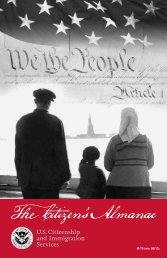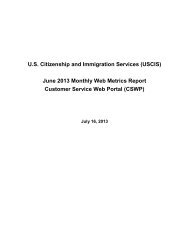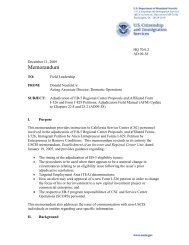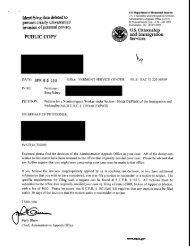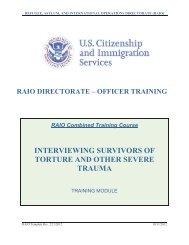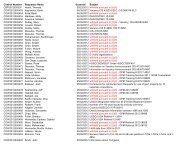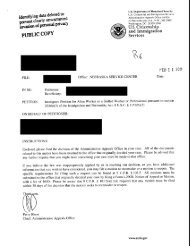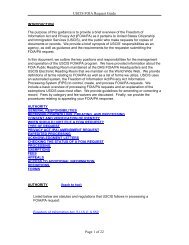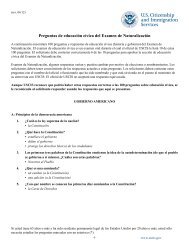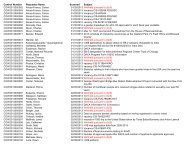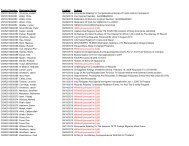~DtJitltk., - uscis
~DtJitltk., - uscis
~DtJitltk., - uscis
Create successful ePaper yourself
Turn your PDF publications into a flip-book with our unique Google optimized e-Paper software.
Page 26<br />
an original contribution made by the beneficiary and that some people read her postings, the<br />
documentary evidence submitted by the petitioner falls far short in establishing that the<br />
beneficiary's blog has been of major significance in the field, It appears that the beneficiary's<br />
blog is her personal political commentary rather than her field of advertising and marketing,<br />
While those familiar with the beneficiary generally describe her as "extraordinary,"<br />
"exceptional," and "professional," there is insufficient documentary evidence demonstrating that<br />
the beneficiary's work is of major significance, This regulatory criterion not only requires the<br />
beneficiary to make original contributions, the regulatory criterion also requires those<br />
contributions to be significant The AAO is not persuaded by vague, solicited letters that simply<br />
repeat the regulatory language but do not explain how the beneficiary's contributions have<br />
already influenced the field. Merely repeating the language of the statute or regulations does not<br />
satisfy the petitioner's burden of proof." The lack of supporting evidence gives the AAO no<br />
basis to gauge the significance of the beneficiary's contributions in the field as a whole rather<br />
than limited to businesses with whom the beneficiary has worked.<br />
Further, USCIS may, in its discretion, use as advisory opinion statements submitted as expert<br />
testimony. See Matter qt Caron International, 19 I&N Dec. 791, 795 (Comm'r. 1988).<br />
However, USCIS is ultimately responsible for making the final determination regarding an<br />
alien's eligibility for the benefit sought !d. The submission of letters of support from the<br />
beneficiary's personal contacts is not presumptive evidence of eligibility; USCIS may evaluate<br />
the content of those letters as to whether they support the alien's eligibility. See id. at 795; see<br />
also Matter (if V-K-, 24 I&N Dec. 500, n.2 (BIA 2008). Thus, the content of the writers'<br />
statements and how they became aware of the beneficiary's reputation are important<br />
considerations. Even when written by independent experts, letters solicited by an alien in<br />
support of an immigration petition are of less weight than preexisting, independent evidence of<br />
original contributions of major significance.<br />
Again, the plain language of the regulation at 8 C.F.R. § 204.5(h)(3)(v) requires "[e]vidence of<br />
the alien's original scientific, scholarly, artistic, athletic, or business-related contributions of<br />
major significance in the field [emphasis added]." The AAO must presume that the phrase<br />
"major significance" is not superfluous and, thus, that it has some meaning. Without additional,<br />
specific evidence showing that the beneficiary's work has been unusually influential, widely<br />
implemented, or has otherwise risen to the level of contributions of major significance, the AAO<br />
cannot conclude that she meets this criterion.<br />
Accordingly, the petitioner failed to establish that the beneficiary meets this criterion.<br />
Evidence qt the alien's authorship of scholarly articles in the field, in pr(ifessional<br />
or major trade publications or other major media,<br />
D Fedin Bros. Co .. Ltd. v. Sava, 724 F. Supp. 1103, 1108 (E.D.N.Y. 1989), ajfd, 905 F. 2d 41 (2d. Cir. 1990); Avyr<br />
Associates. Inc. v. Meissner. 1997 WL 188942 at *S (S.D.N.Y.).



